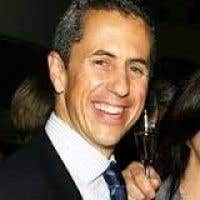Lunch and dinner last Thursday on the Fourth of July will go down as professionally the most memorable in my career, even if not necessarily for the food. The former consisted of a grilled cheese sandwich with leeks and a glass of lemonade at Fernandez & Wells café in Somerset House; the latter was a series of first courses, a bottle of Fleurie, and strawberries and shortbread at Quo Vadis, Soho.
But my lunch guest was Ferran Adrià from elBulli on the eve of the opening of his exhibition, The Art of Food, while in the evening I was with New York restaurateur Danny Meyer (pictured) of the Union Square Hospitality Group after the opening party for Shake Shack, Covent Garden, the 29th branch of this hamburger joint that has spread from the East Coast of the US to the Middle East, Turkey and now to the UK.
Although the meals were radically different, a common thread was the sense of accident that has led not just to the respective success of both individuals and their restaurants but also to the growing number of jobs they are creating today.
The most fascinating aspect of the elBulli exhibition is its exploration of how one restaurant managed to create so many new dishes, over 1,800, in the 15 years it was at its culinary peak. But it omits the one very important factor in precisely why Ferran and his younger brother and co-conspirator Albert were able to do this.
As soon as Adrià had taken a sip of the orange juice that constituted his lunch (he gets nervous on a day of press interviews, he explained), I put it to him that a great deal of his culinary fame derived from the fact that his restaurant closed between October and April. During these months he travelled, tasted and created next year's dishes in the brothers' Barcelona laboratory.
'Precisely, Nick', he replied in rapid French. 'I was very fortunate that I was taken on to be the chef of a restaurant that was by the sea overlooking a beach. Everyone expects somewhere like this to close at the end of October when the weather turns cold. And then I could think.
'But this opportunity is simply not available to those chefs and restaurateurs in the centre of cities. My colleagues at El Celler de Can Roca in Girona, Rene Redzepi in Copenhagen or Heston Blumenthal at The Fat Duck in Bray don't have this luxury. They have to stay open all year round.'
Two years away from the stoves has also brought a new perspective to Adrià: that the example he and so many other chefs in Catalunya have set over the past couple of decades is having an enormous impact on the next generation of chefs, who, he added without compunction, are incredibly hard working and equally talented. As his brother plans to open another five restaurants in the coming year close by the exceptional Tickets and 41 Degrees in Barcelona, Adrià seemed most excited about the job opportunities these would be creating in a country where youth unemployment is sadly at a record high.
That the opening of a temporary hot-dog cart in Madison Square, New York, in 2001 has led to the creation of 120 new jobs as Shake Shack opened in Covent Garden has, by necessity, involved a series of astute business decisions. But the initial one was far from commercial.
Its origins lay, it was explained to me early on 3 July as I sat with the staff of the Hawksmoor group listening to a talk given by Randy Garutti, now CEO of Shake Shack, in the then rundown condition of Madison Square Park. At that time, Garutti explained, 'the only occupants of the park that had homes to go to were the rats'.
Garutti was then general manager of one of two restaurants Meyer operated facing on to the park and it has long been an integral part of Meyer's management philosophy that restaurateurs are responsible for what lies not just inside their restaurants but also outside.
Their initial short-term plan to clean up the park has exceeded all expectations. The park itself is now a delight and safe; it has generated its own webcam so that people can keep an eye on when the Shake Shack queue drops below an hour long; and from a brave desire to clean up a local park has emerged a business with international potential that has already created a total of 1,500 jobs and will create many more.
The launch party in London was conspicuous not just for the number of leading chefs and restaurateurs who were there but also for the quality of the restaurants they represent. The likes of Russell Norman and Trevor Gulliver were there not just to sample the burgers made from Scottish beef, nor the Bermondsey-brewed Kernel beer Meyer discovered on a research trip, but to pay their professional respects.
All of them have embraced the principles Meyer espoused in his book Setting The Table, the most articulate expression of the importance of hospitality in looking after your customers, a challenge that restaurateurs choose to face every day. And while they have read the book, eaten in his restaurants in the US and many of them may even have met Meyer, they have all professionally longed for him to open in London.
Hamburgers, hot dogs and the frozen custards that originate in Meyer's hometown of St Louis may not delight everyone. But hospitality is 51% of what every restaurateur has to deliver and, via a series of accidents, New York's king of hospitality has finally come to London.
elBulli: Ferran Adria & The Art of Food Somerset House, Strand, London WC2R 1LA, until 29 September 2013. Tickets £10.
Shake Shack 24 Market Building, The Piazza, Covent Garden, London WC2E 8RD. www.shakeshack.com
9 Jul 2013
Lunch with Ferran, dinner with Danny

